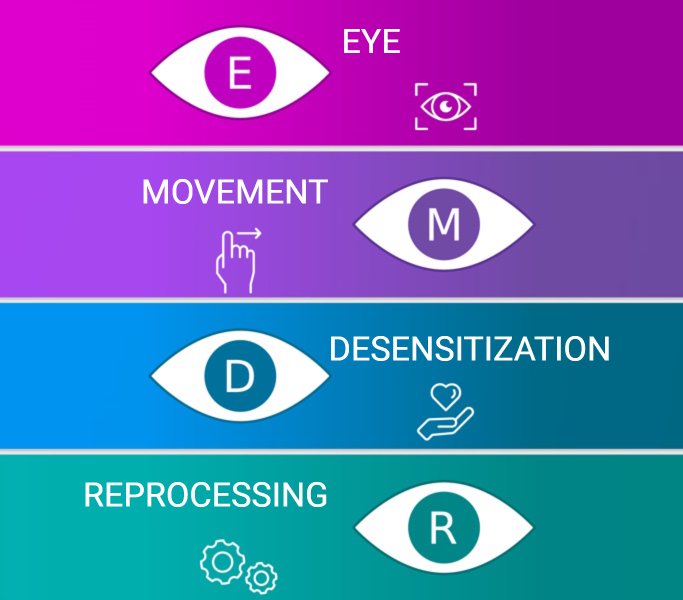Our Services

Cognitive Behavioral Therapy
Cognitive behavioral therapy (CBT) is a directive therapy, which means the therapist leads the process, teaching patients how to develop effective ways of coping with a range of mental health and behavioral problems.
CBT helps you identify and change negative thought patterns and behaviors that are wreaking havoc on your well-being. CBT also helps you recognize and accept events that are beyond your control.
The therapy is structured and focused: Patients learn coping techniques during sessions, such as learning practical, more productive ways to respond to distressing situations.
Eye Movement Desensitization Reprocessing
Developed by trauma therapists, EMDR helps your brain process and release traumatic memories in an unusual way — through your eye movements or other bilateral stimulation.
While traditional talk therapy and medications are the main treatments for post-traumatic stress, you might be wondering what other options are out there.
EMDR therapy was developed by Dr. Francine Shapiro in 1987 to treat post-traumatic stress disorder (PTSD). This therapy uses eye movements (or sometimes rhythmic tapping) to change the way a memory is stored in the brain, allowing you to process it.
This therapy aims to help you work through painful memories with your body’s natural functions to recover from the effects of trauma.
This therapy is based on the theory that traumatic events aren’t properly processed in the brain when they happen. This is why they continue to affect us — with nightmares, flashbacks, and feelings of the trauma happening again — long after the actual trauma is over.
When something reminds you of the trauma, your brain and body react as though it’s happening again. The brain isn’t able to tell the difference between the past and the present.
This is where EMDR comes in. The idea, known as the adaptive information processing model, is that you can “reprocess” a disturbing memory to help you move past it.
This therapy aims to change the way that the traumatic memories are stored in your brain. Once your brain properly processes the memory, you should be able to remember the traumatic events without experiencing the intense, emotional reactions that characterize post-traumatic stress.
During an EMDR therapy session, your therapist will ask you to briefly focus on a trauma memory. Then, they’ll instruct you to perform side-to-side eye movements while thinking of the memory. This engages both sides of your brain and is termed bilateral stimulation.
If you have visual processing issues, your therapist may use rhythmic tapping on both of your hands or play audio tones directed towards both ears.
One theory behind how EMDR works is that it helps the two sides of the brain to communicate with one another — the left side, which specializes in logic and reason, and the right side, which specializes in emotion.
In addition to PTSD, EMDR can also be used to treat anxiety, panic attacks, depression, bipolar disorder, aid in the grieving process, eating disorders, pain management, stress, sleep disturbances and substance abuse/addiction.
EMDR is provided by a highly trained professional who has attended specialized training, practicum and consultation.


PsychodynamicTherapy
While CBT concentrates on the here and now, psychodynamic therapy (PDT) is an exploratory therapy that delves deep into the past and your unconscious to help you gain insight and get to the root of your problems. The idea here is that most people’s thoughts, feelings, behaviors and the choices they make are tied to earlier (sometimes forgotten) experiences.
This can include the role that repressed emotions and experiences has in our problems, interactions and behaviors. By becoming aware of connections, you may find it easier to break unhealthy patterns.
PDT is nondirective and unstructured. The patient is encouraged to take the lead by talking freely about whatever is on his or her mind. It’s the therapist’s job to organize the information over time, looking for patterns and themes.
In CBT, the therapist is like a teacher or coach; here, the patient sets the agenda. In PDT, the patient is on a journey, with the therapist pointing out things along the way. PDT can be short-term, long-term or open-ended.
Pastoral Care
Pastoral care is the provision of spiritual guidance and support to individuals, families, and groups. It can be broken down into seven functions: listening, advising, counseling, teaching, caring, leading, and serving. Each pastor has their own unique style and approach to pastoral care, which is why it is important to have a spiritual advisor who can help you navigate through your personal faith journey.
Pastoral care provides spiritual support and guidance to individuals and families in times of need. This includes but is not limited to:
- Listen to and understand the individual’s needs.
- Provide emotional support and guidance.
- Promote positive self-image and self-esteem.
- Encourage healthy living and coping mechanisms.
- Assist in problem solving.
- Provide information and resources.
- Advocate on behalf of the individual or family.




